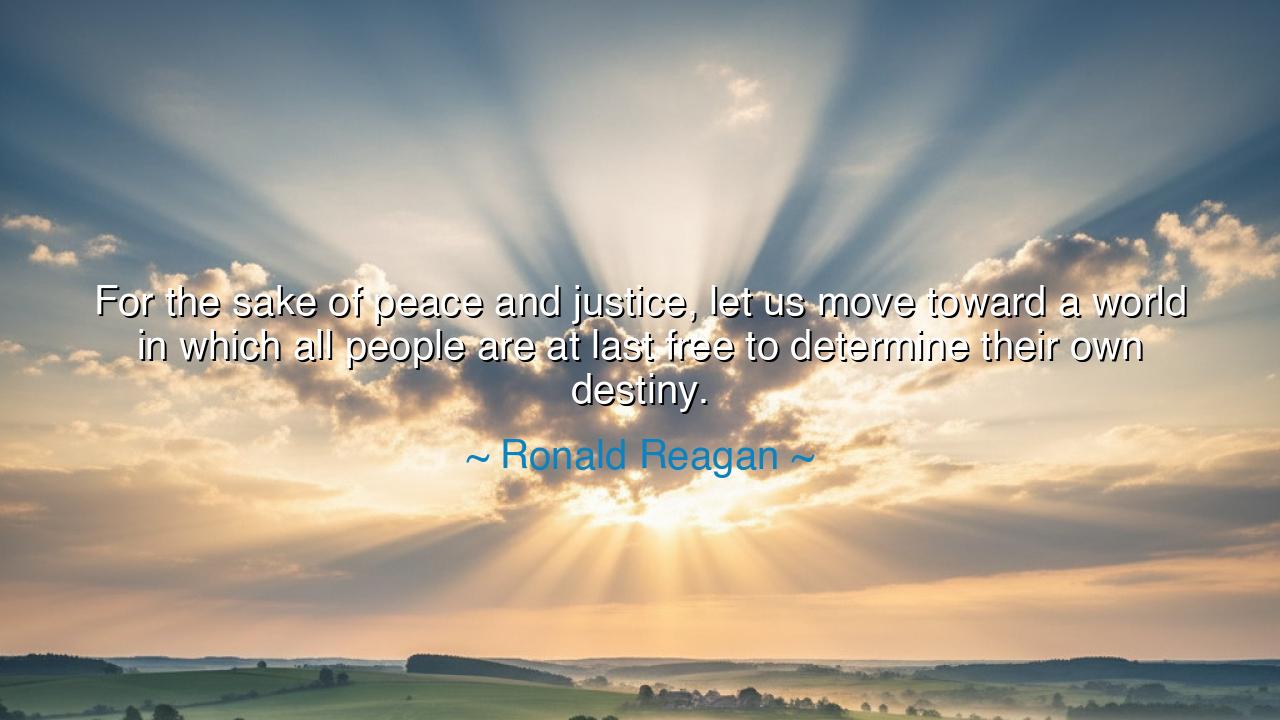
For the sake of peace and justice, let us move toward a world in
For the sake of peace and justice, let us move toward a world in which all people are at last free to determine their own destiny.






Hear the clarion call of Ronald Reagan, spoken with the conviction of one who bore the burdens of leadership in a world divided: “For the sake of peace and justice, let us move toward a world in which all people are at last free to determine their own destiny.” These words carry the strength of vision and the tenderness of hope. They are not merely the words of a statesman but the echo of humanity’s eternal longing: that men and women, unshackled by oppression, may walk in the dignity of freedom, shaping their lives according to the call of their own hearts.
The meaning of this declaration lies in its twofold cry: for peace and for justice. Peace alone, without justice, is but silence forced by chains. Justice alone, without peace, is but strife without end. Reagan wove them together, reminding us that both must stand as twin pillars if humanity is to rise. And yet, he pressed further, declaring that the true measure of both peace and justice is the freedom of every people to determine their own destiny—to choose their path, their leaders, their future. For without this liberty, neither peace nor justice can endure.
The origin of these words can be traced to Reagan’s vision during the Cold War, when the world was divided by iron walls of ideology. He spoke often of a world not ruled by force, but by consent; not divided by tyranny, but united by liberty. His words carried a challenge to the oppressive regimes of his age, declaring that the fate of nations should not be dictated by empires or dictators but by the voice of their people. In this way, his quote was not only political but prophetic, echoing the struggle of all ages between power that dominates and freedom that liberates.
History testifies to this truth. Consider the long night of colonial rule in India. For centuries, the people’s destiny was shaped not by themselves but by foreign masters. Yet through the patient, relentless movement led by Gandhi and countless others, the chains of empire were broken. India at last stood free, a living example of Reagan’s words: that peace and justice are fulfilled only when a nation determines its own course. The same truth has been lived in every struggle where people rose to reclaim their birthright of self-determination.
Yet we must also see the warning within Reagan’s words. Where people are denied the right to shape their destiny, peace is fragile and justice hollow. Tyrannies may appear strong, but they rot from within, for they rest on fear rather than trust. The Soviet Union itself, though mighty in arms, could not suppress forever the longing of its peoples for freedom. When the cracks appeared, the empire crumbled, not by invasion but by the irrepressible cry of human hearts demanding the right to choose their own way.
The lesson for us today is this: we must guard not only our own freedom but the freedom of others. For as long as any people live under oppression, peace is insecure, and justice incomplete. In our homes, in our communities, in our nations, we must defend the right of every soul to live according to their conscience, to speak without fear, to dream without chains. And where we see oppression, let us not be silent, for silence strengthens the oppressor while it weakens the oppressed.
Therefore, let us hold fast to this vision: a world where peace and justice are not hollow words but living realities, where all peoples stand unafraid beneath the sun of freedom. Let us be builders of such a world—not by force, but by courage; not by conquest, but by compassion; not by silence, but by truth. And let us remember always that the destiny of a people belongs not to rulers or empires, but to the people themselves. In this, and only in this, lies the path to a lasting peace.






AAdministratorAdministrator
Welcome, honored guests. Please leave a comment, we will respond soon